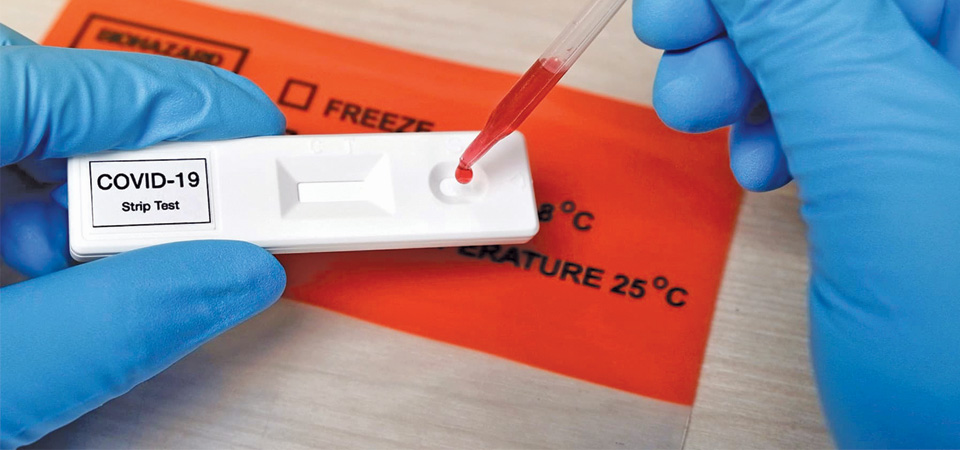'Undergoing antibody test individually not required'

By A Staff Reporter
Kathmandu, Sept. 12: A few weeks ago, the Ministry of Health and Population (MoHP) had said that the COVID-19 antibodies were seen in 68.6 per cent of the samples collected from across the country.
A seroprevalence study was conducted on 13,161 samples chosen randomly from July 5 to August 14.
A preliminary study of the report had revealed that over two-thirds of the population had developed antibodies against the novel coronavirus.
According to the public health specialists, the vaccination campaigns being held rapidly have also helped over half of the population to develop immunity to fight the virus. Thus, it is not necessary for those who have already received a full dose of COVID-19 vaccines to undergo antibody tests, say the experts.
"The antibody test is done to ascertain the necessity of administering a booster dose of vaccines at the community level after the full dose is already provided," said Dr. Shyam Raj Upreti, coordinator of the COVID-19 vaccine advisory committee. "Thus, it is not required for every individual to check their antibodies."
Dr. Upreti added that as the level of antibodies in a human body kept on fluctuating, going for antibody tests to keep track of one's immunity level to fight COVID-19 was unnecessary. "It is the government's duty to conduct antibody tests in masses to know the actual situation of coronavirus in the communities," he said.
Similarly, Dr. Runa Jha, director at National Public Health Laboratory, said that antibody tests could be avoided. "If anyone is willing to know their immunity level, they can undergo the test at Rs. 1,000. However, as the antibody test is done on a group of people at once to map the necessity of booster dose post-COVID-19 vaccination, taking the test individually does not have relevancy," she said.
Dr. Jha added that as antibodies start decreasing after a certain time, the time frame until when the antibodies will remain active to fight viruses was still a subject to investigation.
Likewise, infectious disease specialist Dr. Sher Bahadur Pun also said that there was no need for undergoing antibody tests individually. "Everyone develops antibodies after being vaccinated," said Dr. Pun.
He added, "After vaccination, antibodies will remain in our bodies for around eight months. But antibodies developed post COVID-19 infection wilal not prevail for long."
"The seroprevalence survey done by the government has shown the situation of antibodies in the Nepali community," said Dr. Pun, adding, "However, if anyone wants to know their antibody level, they can undergo the tests three weeks after getting a second jab of COVID-19 vaccine."
Moreover, Dr. Samir Kumar Adhikari, spokesperson for the MoHP, said that the government had already conducted antibody tests of vaccinated and unvaccinated groups.
"If every individual start taking antibody tests, it might give rise to misconduct and fraud in the private sectors. As the government has been conducting seroprevalence studies, it is not required for the public to take the test," said Dr. Adhikari.
Recent News

Do not make expressions casting dout on election: EC
14 Apr, 2022
CM Bhatta says may New Year 2079 BS inspire positive thinking
14 Apr, 2022
Three new cases, 44 recoveries in 24 hours
14 Apr, 2022
689 climbers of 84 teams so far acquire permits for climbing various peaks this spring season
14 Apr, 2022
How the rising cost of living crisis is impacting Nepal
14 Apr, 2022
US military confirms an interstellar meteor collided with Earth
14 Apr, 2022
Valneva Covid vaccine approved for use in UK
14 Apr, 2022
Chair Prachanda highlights need of unity among Maoist, Communist forces
14 Apr, 2022
Ranbir Kapoor and Alia Bhatt: Bollywood toasts star couple on wedding
14 Apr, 2022
President Bhandari confers decorations (Photo Feature)
14 Apr, 2022










